Omar Khayyam
Brief Synopsis
Cast & Crew
William Dieterle
Cornel Wilde
Michael Rennie
Debra Paget
John Derek
Raymond Massey
Film Details
Technical Specs

Synopsis
In the eleventh century, in the Persian city of Nishapur, poet and mathematician Omar Khayyam meets with his secret love Sharain, the daughter of his old professor, Imam Mowaffak. Later, Omar greets Hasani Sabah, the overlord to the Governor of Gilan, who has come to Nishapur seeking a court appointment. Though Omar has none of his friend's ambition, Hasani reminds him of his oath to their childhood friend, The Nizam, who, as Keeper of the Kingdom, desperately needs people in the court whom he can trust. Brought before the Shah, Omar recites a poem which shocks many in the court, but pleases the Shah with its honesty, and is quickly appointed Court Counselor. After presenting the Shah with two beautiful slave girls, as well as the severed heads of two enemies, Hasani is made Keeper of the Seal, a high position formerly held by Tutush, the Shah's brother. In order to strengthen his ties to the people of Nishapur, the Shah decides to take Sharain as his fourth wife, breaking Omar's heart. Hoping to ease his friend's loss, Nizam buys Omar a slave girl named Yaffa, whom he accepts only upon her pleas. That night, Tutush is murdered by the Assassins, a religious sect seeking to overthrow his brother, when he fails to pay the tribute demanded by them. Later, the Shah learns that the Byzantines and their mercenary army have invaded Persia near the Caspian Sea, and upon Omar's advice, the Shah agrees to use ships to organize an army to repel the invaders. As the Shah prepares to join his army, his two sons, Ahmud and Malik, fight over who will stand beside him in battle. When the victorious Malik is made heir to the throne, Queen Zarada, the mother of Ahmud, makes an alliance with Hasani to overthrow her husband. With the Shah away from his court, the Assassins become more active in Nishapur. Grateful that Omar refuses to sell her to the lustful Hasani, Yaffa tells her owner of an ex-Assassin named Yusuf who lives in a cave outside the city. Yusuf tells Omar that the Assassins' hideout is an impenetrable fortress atop the northern mountain of Alamut. On the pretext of working on his new calendar, Omar goes alone to Alamut, where he is greeted by the Assassins as a friend. Upon completing his work, Omar learns that Hasani is the Grand Master of the Assassins. Hasani tells his followers that while the Shah has defeated the Byzantines, half his army has been killed, and both the Shah and Malik have been wounded in battle. Though he is offered a position as counselor to Hasani, Omar denounces his traitorous friend, yet is still allowed to leave the fortress. Omar then rides to the mortally wounded Shah, who has already been told that Ahmud has raised a rebel army against him. Using Byzantine prisoners to dig into Alamut, Omar lights the pools of saffron oil underneath the Assassins' hideout, setting the fortress afire, while Malik, who has been appointed the new Shah upon the death of his father, attacks his brother's troops at daybreak. With the Assassins destroyed and Ahmud killed, Malik makes his first royal proclamation, releasing Sharain from her court vows and into the arms of Omar.

Director
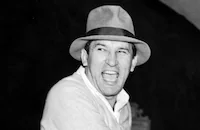
William Dieterle
Cast

Cornel Wilde

Michael Rennie
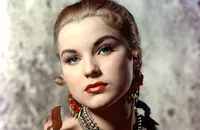
Debra Paget

John Derek
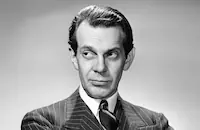
Raymond Massey
Yma Sumac

Margaret Hayes

Joan Taylor

Sebastian Cabot

Perry Lopez
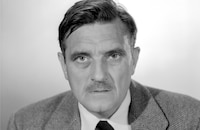
Morris Ankrum

Abraham Sofaer
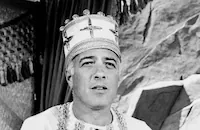
Edward Platt

James Griffith
Peter Adams

Henry Brandon
Kem Dibbs
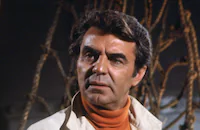
Paul Picerni

Valerie Allen
Florine Caplan
Emilie Stevens
Marie Tsien

Douglas Spencer
Paul T. Salata
Ronald Nyman
John Zollan
Joyce Vanderveen
Charles La Torre
John E. Mather
Joe Bassett
Don Dunning
Franz F. Roehn
Max Power
Frank Leyva
Henry Wills
James Davies
Carl H. Saxe
Dale Van Sickel
Robert St. Angelo
Salah Sayed Ahmed
Romo Vincent
Richard Elliott

John Abbott
Edmund Hashim
Eric Alden
Ric Roman
Paul Weber
E. J. Andre
Bob Tafur
John Merton
Richard Alameda
Alan Wells
Len Henry
Edward Agresti
Bill Bagdad
James J. Hanna
Arthur L. Bucaro
Mary Ellen Popel
Sonia Werner

Joyce Meadows
Sandra Werner
Lee Belser
Audrey Lowell
Arthur Tookoyan
Allan Douglas
Frank Griffin
Richard Gilden
Don A. Diamond
Jean Elliott
Mahin Shahrivar
Jagat Bhatia
Paul T. Salata
Frank Leyva Townsman
John Wilson Gregory
Roger Creed
Abdel Salam Moussa
Phyllis Johannes
George Bruggeman
Crew
Lloyd Allen
Frank Caffey
Arthur Camp
Buddy Clark
Sam Comer
Mack David
Francisco Day
Everett Douglas
Farciot Edouart
Ray Evans
Frank Freeman Jr.
John P. Fulton
Charles Gemora
Grace Gregory
Hazel Haggerty
Peter Herald
Edwin Hodgett
Bill Hurley
Ralph Jester
Alma Johnson
Dick Johnson
Joseph Macmillan Johnson
Henry Keener
Ernest Laszlo
Pep Lee
Winston Leverett
Jay Livingston
Olive Long
Barré Lyndon
Spurgeon Marsh
Dominic Mautino
Joe Mceveety
Bert Mckay
Gene Merritt
Curtis Mick
Harry Mines
Charles Morton
Abdel Salam Moussa
Richard Mueller
Hal Pereira
Lou Phillippi
Roy Roberts
John Smirch
George Swartout
Bill Thomas
Fred True
Moises Vivanco
Frank Westmore
Wally Westmore
Charles Woolstenhulm
Harold Worthington
Buddy Wyler
Victor Young
Victor Young

Film Details
Technical Specs

Quotes
Trivia
Notes
The working title of this film was The Loves of Omar Khayyam. The onscreen title cards read: "The Life, Loves and Adventures of Omar Khayyam." The picture begins with the following foreword spoken by Raymond Massey: "A thousand years ago, the Persian Empire stretched from the Mediterranean Sea, all the way to India and down to Egypt. This great empire was ruled by a warrior Shah. He had the absolute power of life and death. Even the most exalted bent at his feet. Yet this mighty ruler would now be forgotten but for the work of a man who was among the humblest of his subjects: Omar Khayyám. He was a happy man, with friends among both the lowly and the great in the ancient city of Nishapur. The motto of those dangerous and exciting days was 'Think as your master thinks.' But Omar Khayyám thought for himself. He was a lover of life and wisdom, a poet when the mood was upon him and a mathematician when it was not. He was a student of the stars and those things written in the stars. Omar Khayyám had an understanding of human nature and a philosophy which has conquered the hearts of men and of women." Although the name of the real-life Omar Khayyám was spelled with an accent mark, the title of the film omits it.
Born May 18, 1048 in Nishapur, Omar Khayyám was a Persian poet, mathematician, and astronomer, renowned in his own time for his scientific achievements, but better known in modern days for his poetry. His name Khayyám ("Tentmaker") May have been derived from his father's trade. After being educated in the sciences and philosophy, Khayyám went to Samarkand, where he completed an important treatise on algebra and was invited by the Seljuq sultan Malik-Shah to revise the Persian calendar. He was also commissioned to build an observatory in the city of Esfahan in collaboration with other astronomers. After the death of his patron in 1092, Khayyám returned to Nishapur, where he taught and served the court from time to time. Khayyám's poetry had attracted comparatively little attention until Edward FitzGerald published the celebrated The Rubáiyát of Omar Khayyám in 1859, a collection of Khayyám's verse which has now been translated into most major languages and is largely responsible for coloring European ideas about Persian poetry. Omar Khayyám died on 4 December 1131.
According to the file on the film in the Paramount Collection at the AMPAS Library, Omar Khayyam cost approximately $2,272,000 to produce, though Paramount publicity materials put the figure closer to $3,000,000. Actors considered for the role of "Omar" included John Forsythe, Robert Wagner, Rossano Brazzi and John Neville. Actresses contemplated for the role of "Sharain" included Joanne Dru, Yvonne De Carlo, Donna Reed and Joan Collins. Hollywood Reporter news items report that portions of the film were shot on location in the Indio and Palm Springs regions of Southern California.
According to Paramount studio records, a dispute over the authorship and screen credits for Omar Khayyam erupted between the studio and Pasha Khan. Los Angeles Examiner reported on March 5, 1954 that Hosseim Pashe, a bartender at the Vagabond Restaurant in Los Angeles, had sold an original story based on the life of Omar Khayyám to Paramount and had been engaged by the studio to write the screenplay. On March 10, 1954, Hollywood Reporter, referring to the writer as Pasha Khan, stated that he had sold a two-hundred page manuscript on Omar Khayyám to the studio, and that Paramount was retaining him to do further research for the film. In an internal memo, dated April 12, 1956, the studio stated that Khan would not receive any writing credit for the film, as Paramount had purchased the title The Loves of Omar Khayyam from him, but had chosen not to use his story. Under this agreement, Khan was to be paid for twelve weeks of work.
In December 1955, Daily Variety reported that Khan had filed a $27,000 lawsuit against Paramount, arguing that the studio had purchased his script for $1,000 in February 1954, then agreed to pay him for four weeks work to prepare the film and an additional ten weeks work serving as technical advisor. In rebuttal, Paramount stated that Khan had been paid in full according to the terms of his contract, but was not used as the film's technical advisor and thus should not be credited as such. In the suit, Khan sought $2,000 in lost wages, plus another $25,000 for "loss of prestige." The final disposition of this lawsuit has not been ascertained.
Actor Michael Rennie was borrowed from Twentieth Century-Fox for his appearance in Omar Khayyam. Frank Freeman, Jr. received his first credit as producer on the film, having previously worked as an associate producer. Freeman was the son of long-time Paramount executive Y. Frank Freeman, Sr. Daily Variety reported in June 1957 that Paramount was planning to open the film in Teheran, Iran, but it has not been confirmed that the world premiere was held in that city. Other films featuring the character of "Omar Khayyám" include the 1922 release Omar the Tentmaker, starring Guy Bates Post and Virginia Brown Faire under the direction of James Young, and A Lover's Oath, a 1925 Astor Pictures production, directed by Ferdinand P. Earle and starring Ramon Novarro and Kathleen Key (see AFI Catalog of Feature Films, 1921-30).

Miscellaneous Notes
Released in United States on Video September 9, 1992
Released in United States Summer August 1957
VistaVision
Released in United States Summer August 1957
Released in United States on Video September 9, 1992











